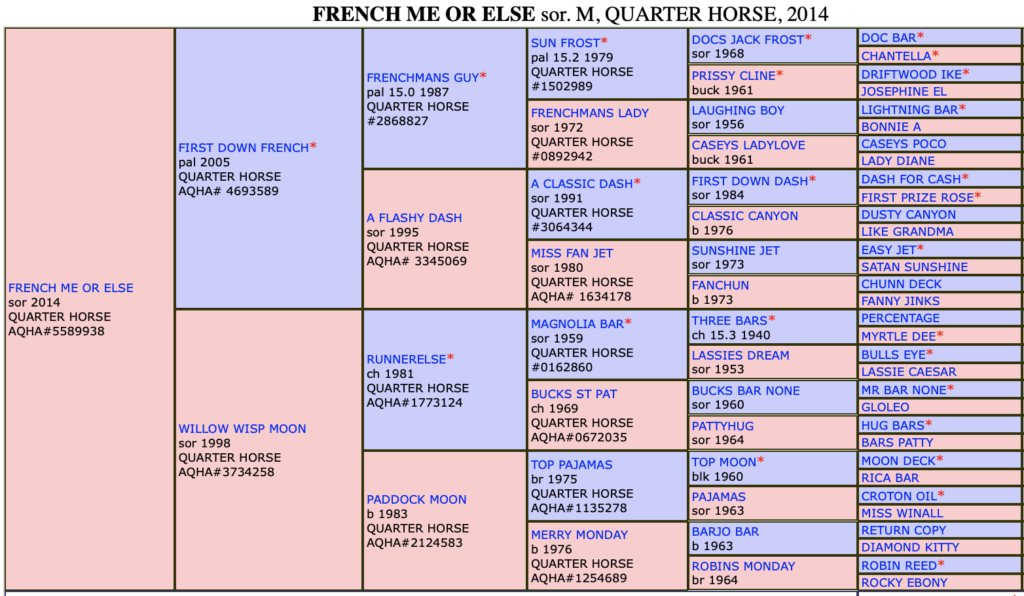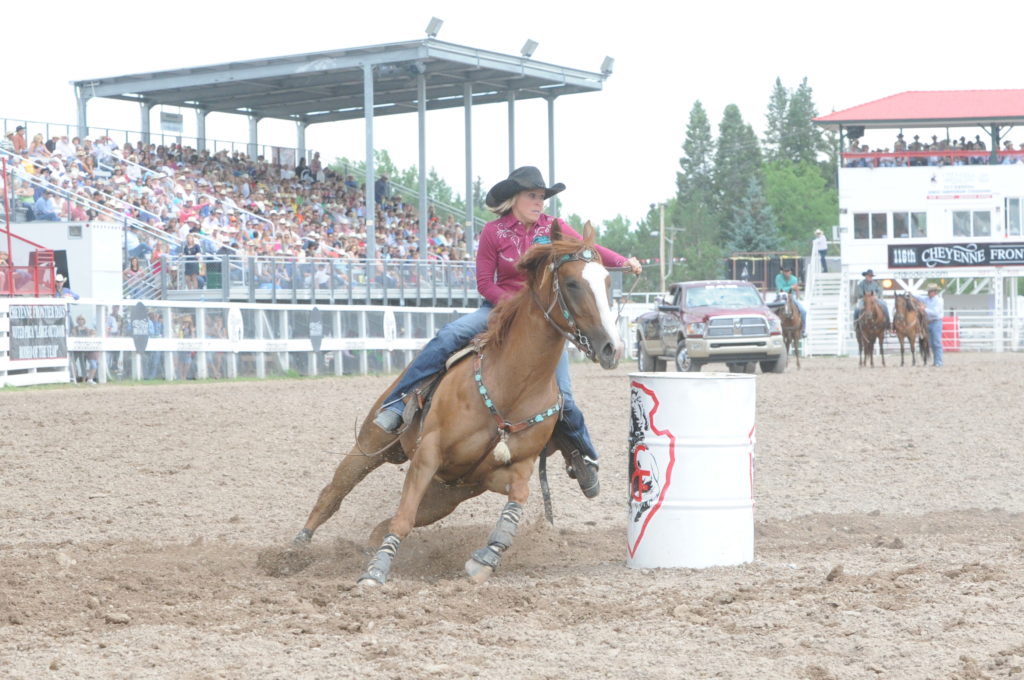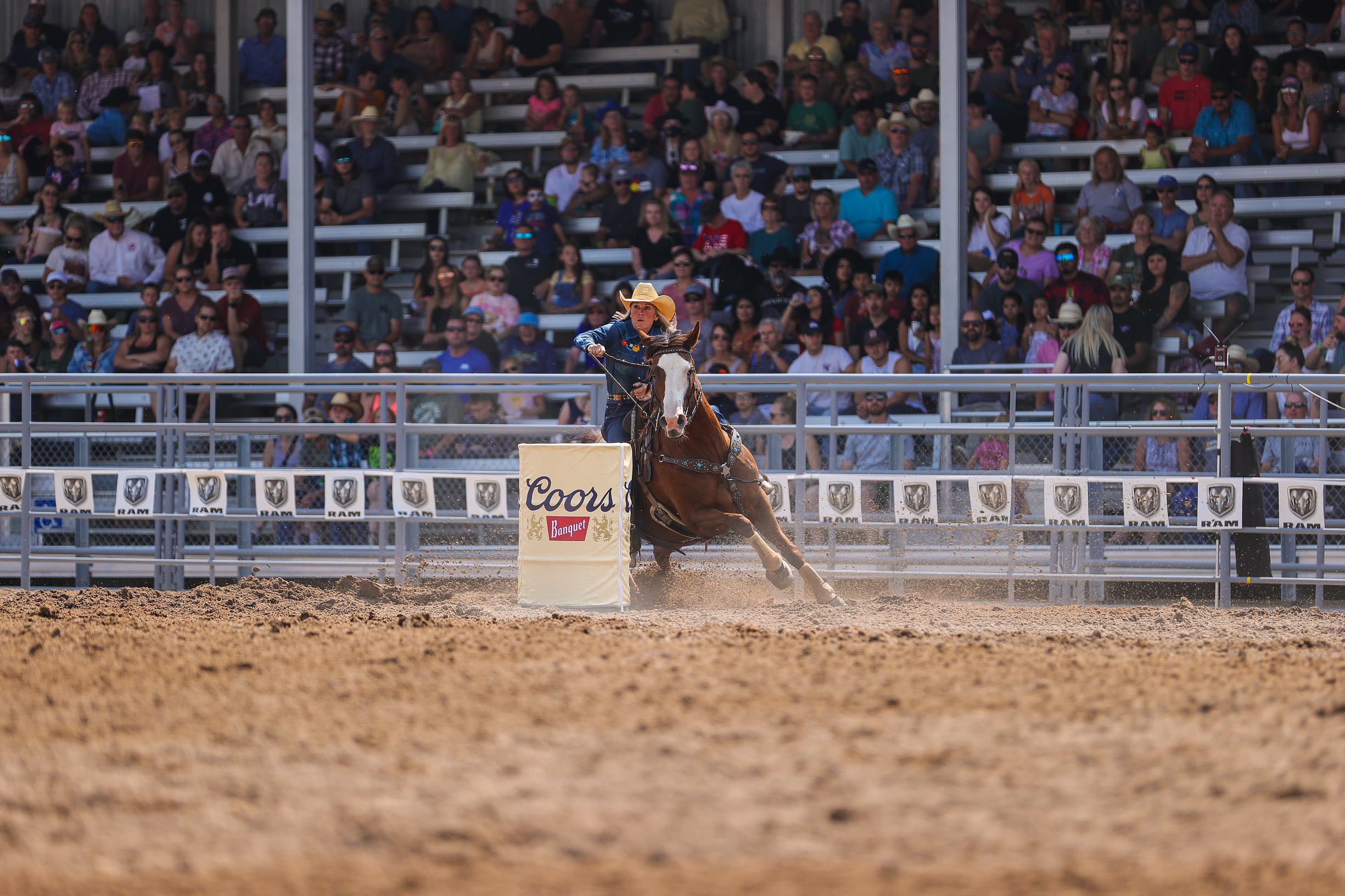“I try to keep things simple,” said many-time Mountain States Circuit Finals Rodeo qualifier and three-time Mountain States Circuit Champion (2010, 2011, 2016) Kim Schulze, Larkspur, Colo. “I think when we try to overdo it or do too much, we can overcomplicate things. We lose confidence in our horse and vice versa. There are so many variables involved in barrel racing so the simpler I can keep it, the better.”
Schulze says that lack of consistency is one thing she notices regularly with people who ask for help with their barrel horses. She’s devised a simple way of breaking her objectives down to three basics, “the three C’s,” which, in no particular order are: Control, Confidence, and Consistency.
“When people come ride, I notice that often there’s not a lot of consistency. They’re not riding to set spots in their slow work. When they go fast the horse doesn’t really know what to expect, so neither horse nor rider have much confidence going into a run.”
Schulze says that by keeping the three C’s in mind when riding her personal horses, or when helping others, she is better able to target her objectives.
Control
Barrel racing needs to be a controlled runoff, not just a runoff, says Schulze.
“First off, I want control at all times. I get that through consistent slow work, and that in turn builds confidence,” she said.
“I had a friend who started coming to ride with me and the first time she came over, she was really scared, literally,” said Schulze. “That made it necessary to get more control because her horse was calling all the shots. That would scare me too.”
Schulze says that if she picks up on the reins to rate or move her horse over, she expects an immediate response.
“Or, if I sit down to slow down, I want my horse paying attention to me at all times. I don’t want them bracing on me at all,” she said. “I notice a lot of riders with little to no control of their barrel horse. That’s scary to watch so it’s got to be scary as a rider. If I say ‘whoa,’ I want my horse thinking about slowing down or stopping depending upon however much rate I’m asking them for.”
To reinforce rate, Schulze starts gradually.
“With my friend’s horse, we had to start slow, like at a walk and a jog just getting him to listen to her,” said Schulze. “I had her just walk, break him at the poll, sit and say whoa until he started to listen. It took a lot of repetition until he got it on his mind and regained some respect. We built to the trot with the same steps then trotted to the first barrel, breaking at the poll, sitting, and saying whoa until he quit just wanting to take off. Her confidence just shot up.”
Even though barrel racing is a timed event, Schulze prefers her horses to go however fast or slow she asks them to go.
“You don’t just want to be along for the ride in my opinion,” said Schulze. “If you want to trot or slow lope at home or in exhibitions then that’s what your horse should do. If they want to take off at the gate, you’ve got to teach them that when you want to stop or slow them down, they need to be responsive to those cues.”
Schulze thinks riders can nip a lot of gate issues in the bud before they become full blown by gaining a degree of respect so the horse isn’t making all the decisions.
“I’m not saying pick at them and overdo it because your horse’s confidence is affected by everything you do,” she said. “They’ve got to be responsible to an extent, but not forgetting that I’m up there.”
Consistency
Control and consistency go hand in hand in Schulze’s mind.
“For me, when I work my horses, my spots around the turn never, ever change,” she said. “For some they might need to rate 2 to 3 feet before the barrel and maintain that distance through the turn for that to be ‘their spot;’ it’s whatever works best for that individual horse, their size, their stride, and their speed, but whatever it is, I want them to look for that spot every single time.”
Schulze has learned that consistency in her slow work eliminates confusion and produces confidence in her horses.
“Elsie (French Me Or Else, RFD-TV’s The American qualifier, pro rodeo winner) really taught me that because after I got hurt in 2017 she was really young and green and I knew I needed to be riding her, but I could only do so much,” she said. “I did lots of slow work and she just gained so much confidence in that process.
“I’d walk or trot through the barrels just stopping at those same spots. Now, she knows her spot and she’s extremely confident and loves her job. So even though she’s an aggressive individual and had a tendency to get over excited, she’s got that foundation of just knowing where to go every single time, and that carries over very well to her competition runs.”

Schulze says the experience of training Elsie by doing the exact same thing proved to her that repetition builds skills, muscle memory and reinforces confidence on the pattern.
“People always ask me how often I work the pattern,” said Schulze. “Well, I might work the pattern every day—I might go eight or 10 times through, which sounds like a lot—but I’m walking and trotting, not making runs. Occasionally, I lope through, but the walking and trotting has worked a lot better for me in that it relaxes them, especially some of these really high-powered, running-bred horses. I’ll stop and sit and let them relax and just chill out at the barrel. I think my horses are confident and relaxed, which makes them well-equipped to handle pressure situations in competition.”
Schulze says that when people ask for her advice or to come over and ride, it’s not uncommon that when they work their horse, they ride to different spots each time they make a pass through the pattern.
“I ask them, ‘Is that your spot?’ and sometimes they don’t really know,” she said. “I just think it’s important to determine what works and do that consistently.”
Confidence
“We all know how important confidence is, it’s really everything, and both the horse and the rider must have it,” said Schulze. “Confidence can be gained or lost in one run, so you really have to be disciplined and diligent about keeping yourself positive and your horse liking its job.”
By keeping things as simple as she can, Schulze says she’s managed to maintain consistency and confidence throughout the process.
“You’ve got to build their trust. To really work, there’s got to be a mutual respect between the horse and you,” she said.
“All that said, if I feel that their feet need to move a little faster, I’ll ask them to quicken their feet or turn them twice around the barrel and hustle them a little, but I really make an effort not to pick them apart. It’s the same stuff during exhibitions. Some horses, if they see something in the arena going slow, they’ll be looking for it in their run, so you really have to know your horse.”
Breaking things down to the three C’s has proven beneficial for Schulze and she hopes control, consistency and confidence in your barrel racing helps you get the results you’re after too.

About Kim Schulze
Kim Schulze is a 10-time Mountain States Circuit Finals Rodeo qualifier and three-time circuit champion. She earned the barrel racing championship of the 2011 Cheyenne Frontier Days Rodeo, which was the same year she finished her season as the Mountain States Circuit champion barrel racer. Schulze was the 2013 Canadian Pro Rodeo Association reserve champion barrel racer and is a past Ram National Circuit Finals qualifier. She finished 16th in the 2013 WPRA World Standings and her horse Vegaspeed, “Speedy,” was voted the Mountain States Circuit Barrel Horse of the Year on two separate occasions.
Schulze and her husband Shayne split their time between their home in Larkspur, Colo., and Texas. They have two grown sons, Cade and Kai, and three grandchildren, Kymbre, Kannyn and Acee.





